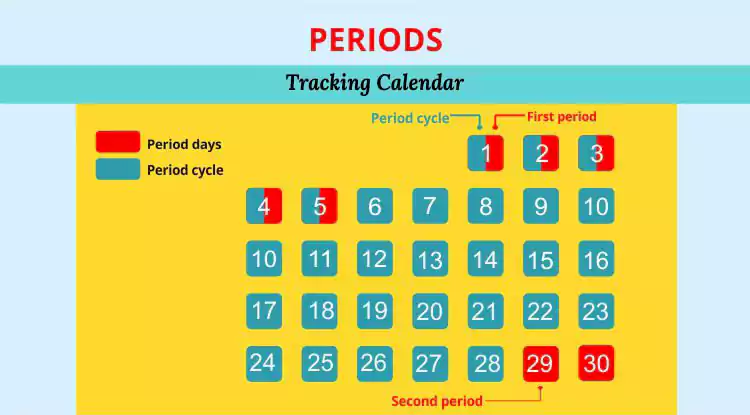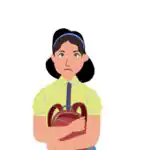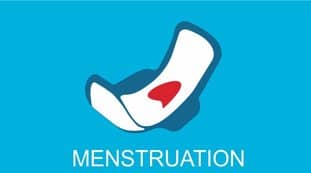Menstruation: A handy guide to periods
Sara’s friends have started menstruating. She is curious about when her own period might start and has many other questions. You do too? Then come join Sara and her friends as they explore this important milestone in their journey to adulthood.
A new period
-
 So our girl gang had our weekly WhatsApp group call today. Our mothers allow it once a week. Phew!Also, don’t forget to check out this super cool video about periods below. Rest of the article below video!
So our girl gang had our weekly WhatsApp group call today. Our mothers allow it once a week. Phew!Also, don’t forget to check out this super cool video about periods below. Rest of the article below video!
It’s A New Thing
- There are many changes that happen in our bodies during puberty.
- One of the big changes is the onset of periods, menses, or menstruation.
- Girls who have reached puberty have a period once every month for a few (3-7) days. It is known as menstruation.
- So what are period symptoms? During periods, a small amount of blood comes out of the vagina.
- Some girls may also experience period pain, period cramps, pimples, stomach pain or back pain during menstruation.
- You may also feel irritable or have mood swings caused by hormones during menstruation.
- Menstruation starts at different ages for different girls. It can begin as early as 8 or quite late into your puberty. It varies from person to person. A delay in the period’s start should not worry you.
- Menstruation stops somewhere between the late forties and fifties. This is called Menopause.
What am I going to do?
-
 Hey I am Pia! It was fun breaking the news to the girls. Sara was a bit freaked out. She threw so many questions at me. Did I freak out? What did I do? Who did I tell? I had to do a 1-2-1 with her later at the school to answer a million questions, including if I could teach her how to use a sanitary pad.
Hey I am Pia! It was fun breaking the news to the girls. Sara was a bit freaked out. She threw so many questions at me. Did I freak out? What did I do? Who did I tell? I had to do a 1-2-1 with her later at the school to answer a million questions, including if I could teach her how to use a sanitary pad.
The Menstruation Kit
- There are a variety of products that can be used to absorb or collect the blood that comes out of the vagina during the period.
- The most commonly used are sanitary napkins that are available in medical and general stores.
- A sanitary pad is worn between the underwear and the genitals in such a way that the absorbent middle part of the pad exactly covers the opening of the vagina to absorb the blood flow.
- Sanitary napkins must be changed 3-4 times a day or more frequently if the flow is heavier. After use, the sanitary pad should be wrapped and thrown in a dustbin meant for toilet waste.
- Tampons are small chalk-shaped absorbents that soak in the menstrual blood.
- The tampons have to be inserted inside the vagina with a thread hanging out to pull out after use. Like pads, tampons should also be changed 4-6 times a day. They are easier to store and carry and are easier for those who play sports.
- After use, tampons should also be wrapped and thrown in a dustbin meant for toilet waste.
- Another method to manage period blood are menstrual cups.
- Menstrual cups are made of rubber (silicon) and inserted into the vagina. The cup only collects the period blood and does not absorb it. Menstrual cups produce no menstrual waste, unlike sanitary pads and tampons, and can be re-used for upto ten years.
- A menstrual cup must be disinfected at the beginning and end of each period, by boiling it in water for 10-20 minutes.
- When the menstrual cup fills up, it should be emptied into a toilet or sink and washed with clean water and reinserted as required.
Oh, what a ‘nuisance’
-
 It’s nice that Pia was so calm about her first period. I was so stressed that I did not step out of my house for a few days. What if I stain my dress, what if everyone found out and then I had these crazy menstruation cramps. On top of that, Dadi kept telling me not to step into the kitchen or touch the pickles or water container. Seriously, it was a bit too much!
It’s nice that Pia was so calm about her first period. I was so stressed that I did not step out of my house for a few days. What if I stain my dress, what if everyone found out and then I had these crazy menstruation cramps. On top of that, Dadi kept telling me not to step into the kitchen or touch the pickles or water container. Seriously, it was a bit too much!
You Can Do Anything!
- Menstruation is a healthy process of the female body and it should not prevent us from taking part in everyday activities like going to school, playing or meeting friends.
- It is a myth that females shouldn’t do certain tasks or touch things like pickle or water containers during periods. They have no scientific basis to them.
- It is important that you talk to your parents, teachers or other trusted adults if you feel confused, embarrassed or scared about menstruation.
- You just need to look after your health and hygiene during menstruation. Some ways to be healthy are regularly bathing, changing pads/tampons/emptying cups, washing hands, eating healthy food, mild exercise and wearing clean clothes.
But what’s the logic?
-
 Ok, so it’s normal and healthy. But none of us were quite sure why it happens and why now. I mean what changed! That too every month for like 40 years! And why just the girls. It’s not even fair! Wish someone would explain it in detail.
Ok, so it’s normal and healthy. But none of us were quite sure why it happens and why now. I mean what changed! That too every month for like 40 years! And why just the girls. It’s not even fair! Wish someone would explain it in detail.
The Why Of Menstruation
- The purpose of menstruation is to make the body of a female ready to have a baby when she grows up.
- During puberty, the female reproductive organs begin to develop this capacity.
- In order to help prepare for a baby, the female reproductive system (specifically the ovaries) begin to produce tiny egg cells.
- Just like the egg cells in a girl’s body, there are sperm cells in a male’s body.
- When an egg cell meets the sperm cell, it results in the formation of a feotus which then develops for nine months to turn into a baby. (More on the reproduction page.)
- As puberty hits, the hormones in the body cause one of the ovaries to release an egg cell. This process is called ovulation and takes place once every month.
- When the ovulation happens, the body takes this as a sign and begins to prepare for a feotus by increasing the blood supply to the female reproductive organs. And so the uterus starts to develop a lining of soft tissue filled with blood.
- When the egg cell doesn’t meet the sperm cell, this extra layer of blood is no longer needed in the uterus and it flows out of the vagina.
- This is what we call a period or menstruation.
- The onset of menstruation does not mean that the body is ready to carry a pregnancy as the uterus has not matured fully and will take a few more years.
- Also, a female needs to mentally ready for a pregnancy.
- This mentrual process repeats every month and is called the menstruation cycle. The dates however may vary.
A calendar invite!
-
 That was some heavy science! But if it’s going to be a monthly affair with changing dates, it’s going to be tough to manage? What if I don’t have a pad or I have a swimming competition! It would be nice to have a reminder service so that I can be well-prepared!
That was some heavy science! But if it’s going to be a monthly affair with changing dates, it’s going to be tough to manage? What if I don’t have a pad or I have a swimming competition! It would be nice to have a reminder service so that I can be well-prepared!
Do The Math
- It’s possible to know the period cycle and when to expect the next period.
- Follow the steps below to understand your period cycle.
- Let’s assume that the first day of your period is 1 May.
- You menstruate for about 5 days.
- The next time you have your period is 29 May.
- Now count the number of days from the first-period date to the second-period date. Do include 1 May when you are counting.
- The count comes to 29 days.
- So, this means that your cycle is 29 days long.
- For other people, it may be as short as 21 days or as long as 36 days.

Now I know
-
 It’s helpful to know about menstruation meaning. I feel much better prepared for whenever I start with my period! I don’t feel so nervous anymore.
It’s helpful to know about menstruation meaning. I feel much better prepared for whenever I start with my period! I don’t feel so nervous anymore. -
 It’s good to be able to talk about periods. Sharing has reduced my monthly stress about periods.
It’s good to be able to talk about periods. Sharing has reduced my monthly stress about periods.
All About Menstruation
- There are many changes that happen in our bodies during puberty.
- One of the big changes is the onset of periods or menstruation, also sometimes called menses.
- Menstruation starts at different ages for different girls. It can begin as early as 8 or quite late into your puberty. It varies from person to person.
- There is a variety of products that can be used to absorb or collect the blood that comes out of the vagina during the period.
- Menstruation is a healthy part of a female’s life and it should not prevent us from taking part in everyday activities like going to school, playing or meeting friends.
- You need to look after your health and hygiene during menstruation. Some ways to be healthy are regularly bathing, changing pads/tampons/emptying cups, washing hands, eating healthy food, mild exercise and wearing clean clothes.







Thanks for this information I am so glad to know this 😊
Tq so much I also have some problems u gave me some information